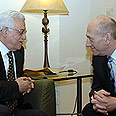
Much has changed since the elections a year ago in which Prime Minister Ehud Olmert presented the Israeli public with his convergence plan. And we, the Israeli public, have come a long way since giving Olmert the mandate to lead us down the unilateral road.
After what is now officially known as the Second Lebanon War, and after being bombarded with hundreds of Qassam rockets, the Israeli public knows that unilateralism just won't do it.
We need a political horizon. We need to know what our red lines are. We need to know where we are willing to make concessions (because ultimately concessions will have to be made) and we need to know that our leadership can take us there. At the moment though, our leadership is stranded, and we wait.
Our waiting period has now exceeded six years. Six years without serious dialogue between official Israeli and Palestinian leaderships. Waiting periods such as this create a political vacuum and we can only imagine what is destined to fill the void.
The Oslo talks, the Stockholm talks, the Geneva Initiative and Israeli-Syrian talks are but a few illustrations of initiatives that have filled previous voids. Indeed, voids and waiting periods are fertile grounds for Track II diplomacy, that is, unofficial discussions aimed at resolving disputes in settings less sensitive than those of official talks.
Is Track II diplomacy the answer?
Relevant research, such as Track II Diplomacy: Lessons from the Middle East (by Arab and Israeli co-authors Agha, Feldman, Kalidi and Schiff,) has shown that Track II channels have many advantages. Those include the ability to forge contacts among adversaries; gaining recognition of one another at the individual and human levels; and gaining information about each other's intentions and in so doing preparing the ground for a smoother official negotiation process.
Most notably though, Track II Diplomacy provides a deniable venue for testing innovative ideas and for eliciting reactions to them without incurring significant political costs.
However, the above-mentioned book, as well as our own disappointing regional experience, makes it clear that the public cannot expect the same results from Track II as we do from official talks.
Hard Track II talks aimed at leading to official negotiations often take a while to produce substantial results, are worthless if exposed before they mature, and are often dismissed by the official leaderships when revealed.
Better sooner than later
In other cases the fear of concrete steps proposed by Track II has pushed leaderships to come out with an alternative plan - opposed to the spirit of dialogue. The Geneva Accord is clearly an illustration of the latter in that, as explained by then PM Sharon's confidant, Dov Weisglass, in order to counter the Accord Sharon came out with his own unilateral disengagement plan. Less than two years down the line the unilateral pain is as sore as ever.
As such, the Israeli government should take the leadership reigns the public has entrusted it with and embark on an official channel with our Arab neighbors.
Nonetheless, a good starting point could be to use the ample Track II agreements as a basis for negotiations – the laborious work done in the absence of official leadership should not be frowned upon and should not be dismissed.
Better sooner than later - because Israel needs a political horizon, and because our waiting period has now exceeded six years.
Michal Radoshitzky is the Director of Foreign Relations at Geneva Initiative and an M.A. Political Communications Student at Tel Aviv University















